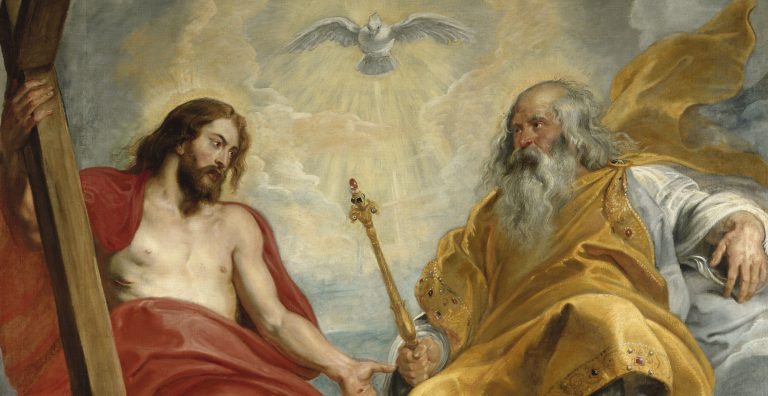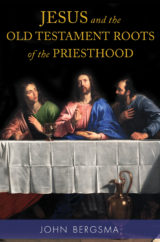By John Bergsma
Dr. John Bergsma is Professor of Theology at the Franciscan University of Steubenville. A former Protestant pastor, Dr. Bergsma has authored several books on Scripture and the Catholic faith, including Jesus and the Old Testament Roots of the Priesthood.

Let’s discuss the idea of calling priests “father.” In Matthew 23:9, when Jesus says, “And call no man your father on earth, for you have one Father, who is in heaven,” does Jesus mean that literally or is he just driving home a point using strong terminology? I would say it’s the latter. Catholics are criticized for this because Catholics call priests “father.”
When Jesus said to “call no man your father on earth, for you have one Father, who is in heaven,” he is using an expression that has deep roots in the Hebrew Scriptures. To “call” someone by a “name” in the Hebrew tradition meant something closer to “identifying the essence” of a person. For example, when the prophet Isaiah says of the Messiah that “his name will be called Wonderful Counselor, the Mighty God, Everlasting Father, Prince of Peace,” he certainly does not mean that those titles will be commonly used as names of the Messiah by his contemporaries. None of Jesus’ contemporaries, not even the Apostles themselves, called him those things. Rather, the “name” here means the essence, and Isaiah is describing the nature of the Messiah, who will be, in his very nature, the “Mighty God” who shares the essence of the “Wonderful Counselor” (the Holy Spirit) and the “Everlasting Father” (God the Father).
So, in this Hebrew tradition, when Jesus says, “Call no one on earth your father,” he means, “Recognize no one on earth as your father in his essence for by nature and by essence, there is only one Father, that is, God the Father.” In a very real sense, all other fathers, even one’s own biological father, are imitation fathers, because God is the true Father who begets children in a way that only He, as God, can. When you were conceived, God created your soul de novo, “new,” and ex nihilo, “from nothing.” That is true fatherhood!
Your biological father did not create anything de novo or ex nihilo. Your biological father contributed to your body in a physical process that was wondrously fashioned by God, but nonetheless completely natural and according to physical laws. In a very real sense, your physical father is only a father by analogy, that is, human fatherhood is similar to true fatherhood, which God alone exercises. Another way to look at it is that we can call our biological fathers “Father” only because God is our true Father. All paternity is an imitation of the paternity of God the Father, as St. Paul says: “I bow my knees before the Father, from whom all fatherhood [Greek patria] in heaven and on earth is named” (Eph 3:14–15, my translation).
Likewise, ministerial priests are like God the Father, who begets in a spiritual and supernatural way. As some theologians have pointed out, the ministerial priest is more like God the Father than a biological father is. When a ministerial priest baptizes a baby, he’s bringing about new spiritual life. Through the Word and the Spirit he is “birthing” a soul, moving it from death into life. This is more like how God creates a soul than like biological procreation. True fatherhood is spiritual in its essence. So, when Jesus says, “call no man your father on earth, for you have one Father, who is in heaven,” he is emphasizing that all true paternity is in God the Father, and all human paternity is only an imitation of divine paternity.
Nonetheless, both Jesus and the Apostles continue to call men “fathers” in their teaching and conversation. In Luke 16:24, for example, Jesus tells a parable in which he refers to Israel’s great ancestor as “Father Abraham.” Likewise, St. Paul, in his Letter to the Romans, refers to Abraham as the “father of all . . . who believe” (Rom 4:11). A few verses later, St. Paul again calls Abraham the “father of us all” (Rom 4:16). In his Letter to the Philippians, St. Paul says that Timothy, “as a son with a father . . . has served with me in the gospel” (Phil 2:22). In his First Letter to the Corinthians, St. Paul says, “For I became your father in Christ Jesus through the gospel” (1 Cor 4:15). This is particularly significant because he is claiming a spiritual role of fatherhood for himself.
The most interesting, perhaps, of all these examples, is in 1 John, where the Apostle says: “I am writing to you, fathers, because you know him who is from the beginning. I am writing to you, young men, because you have overcome the Evil One. I write to you, children, because you know the Father” (1 John 2:13–14).
Now, most commentators, going all the way back to the Church Fathers, don’t think that St. John is speaking to woodenly literal groups here, as if “fathers” means all those and only those men in the congregation who have biological children, and “young men” means all the males of the congregation between fifteen and twenty-five, and “children” refers to the youngsters up to age fourteen.
No, the context begs for these terms to be understood as categories of spiritual maturity and/or role in the church community. Even Protestant commentators will acknowledge that “fathers” probably corresponds to the presbyters or “elders” (Greek presbuteroi) of the congregation; the “young men” refer to those Christians who had completed initiation, that is, who had completed basic catechesis and were growing deeper in their faith; and “children” were recent converts receiving formation or in other words, the catechumens.
The first person recorded as addressing Christian presbyters (priests) as “fathers” turns out to be one of chief Apostles, and he does so in the very pages of the Scriptures themselves.
You Might Also Like
In Jesus and the Old Testament Roots of the Priesthood, biblical scholar John Bergsma convinces readers that Jesus did, in fact, intend for a ministerial priesthood to be a key feature of the New Covenant.
Bergsma shows how the priesthood is a major thread holding together the biblical story line—beginning with Adam’s loss of the gift of priesthood in the Fall and the long process of restoring his descendants to a priestly status over the centuries, culminating with Christ.
